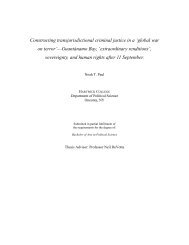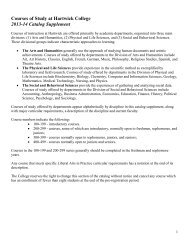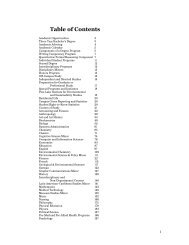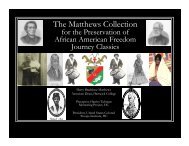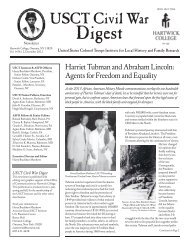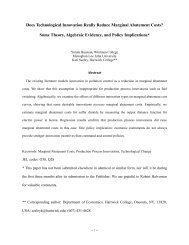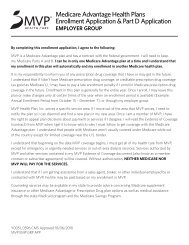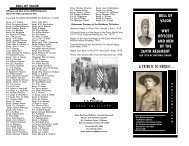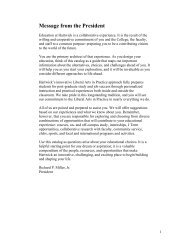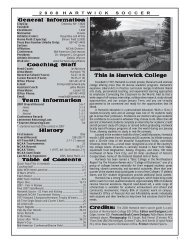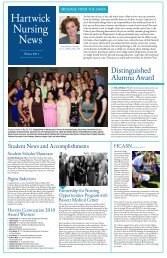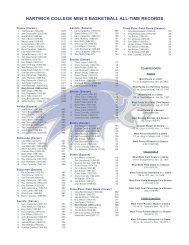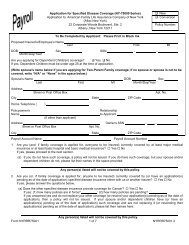Table of Contents - Hartwick College
Table of Contents - Hartwick College
Table of Contents - Hartwick College
You also want an ePaper? Increase the reach of your titles
YUMPU automatically turns print PDFs into web optimized ePapers that Google loves.
servitude, and peonage. The second unit surveys the ways in which<br />
laboring people resisted and sought to shape their own worlds. The final<br />
unit examines labor during and after the Age <strong>of</strong> Revolution, focusing on<br />
the rise <strong>of</strong> wage labor and its attendant problems, as well as workers’<br />
movements. Special attention will be paid to the connections between<br />
class, race, and gender. (NTW)<br />
171 Changes in the Land (3 credits) This course introduces students to<br />
Changes in Land Use in this Central New York and Catskill Mountain<br />
region from the late 1700s to the present, through an analysis <strong>of</strong> forces <strong>of</strong><br />
change, for example, decline or increase <strong>of</strong> natural resources, including<br />
wildlife, technology, demographics, urban influences and market<br />
demands, as well as their socioeconomic impact. For example, there is a<br />
unit on Hunting as Economic Development. Besides history texts, the<br />
course materials include songs, poems, folk tales, interviews,<br />
photographs, and newspaper articles. The first unit analyzes the changes<br />
in land use from the 1700s to the present <strong>of</strong> the area now encompassing<br />
<strong>Hartwick</strong> <strong>College</strong>’s Pine Lake Environmental Campus. The course usually<br />
is taught in the fall semester in a classroom at Pine Lake and includes<br />
field trips. (FYS)<br />
201 Colonial Latin America (3 credits) This course is an overview <strong>of</strong><br />
the most significant historical processes and themes that contributed to<br />
the formation, evolution and development <strong>of</strong> Colonial Latin America. The<br />
course studies the main streams that have contributed to the emergence<br />
<strong>of</strong> Latin America, from pre-Columbian cultures and the first encounter<br />
between the Old and New Worlds to the military, religious and<br />
bureaucratic conquests <strong>of</strong> the New World and the formation and<br />
evolution <strong>of</strong> a colonial society that came to an end with the Wars <strong>of</strong><br />
Independence from Spain in the early 19 th century. (NTW)<br />
202 Modern Latin America (3 credits) This course examines the most<br />
significant themes, events and personages that played an important role<br />
in shaping contemporary Latin America. The period under examination<br />
encompasses the two centuries beginning with the precursors <strong>of</strong> the Wars<br />
<strong>of</strong> Independence in the 19th century and the events taking place at the<br />
close <strong>of</strong> the 20th century. (NTW)<br />
207 History <strong>of</strong> Ancient Greece (3 credits) An introduction to the<br />
history <strong>of</strong> the Greeks from their beginnings up to the death <strong>of</strong> Alexander.<br />
The class examines the values and the ideas <strong>of</strong> these people; and their<br />
literature and art are used in this undertaking as instruments <strong>of</strong><br />
discovery. (WHS)<br />
208 History <strong>of</strong> Republican and Imperial Rome (3 credits) An<br />
introduction to the history and culture <strong>of</strong> the ancient Romans from their<br />
origins up to the death <strong>of</strong> Constantine. The class explores the life, beliefs,<br />
and institutions <strong>of</strong> these people through an examination <strong>of</strong> their cultural<br />
and political achievements. (WHS)<br />
209 Medieval Europe (3 credits) This course traces the emergence <strong>of</strong><br />
Europe through the synthesis <strong>of</strong> Greek, Christian, Roman and Germanic<br />
cultures. The survey will begin with the collapse <strong>of</strong> the Pax Romana in the<br />
third century and conclude with the crisis <strong>of</strong> the 14 th century and its<br />
immediate aftermath. The survey will focus on Western Europe, but the<br />
class will discuss Byzantium and Islam as unique civilizations, which<br />
pr<strong>of</strong>oundly influenced European culture. (WHS)<br />
145



